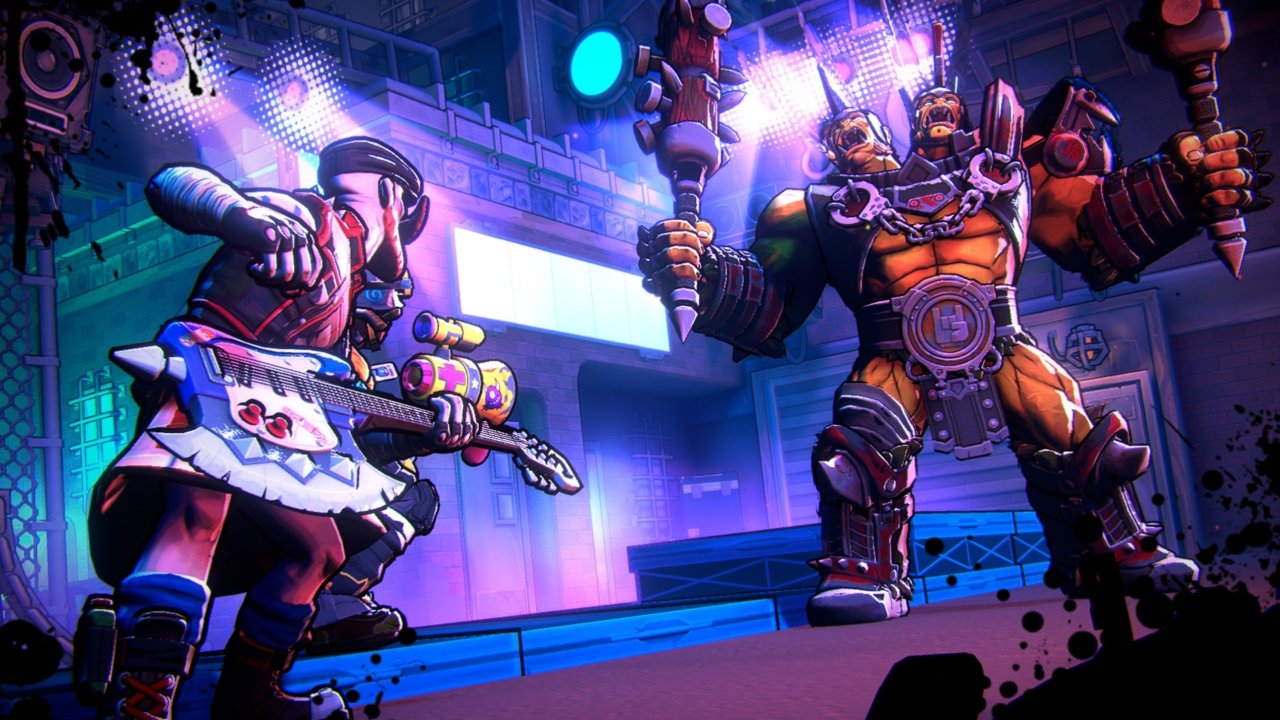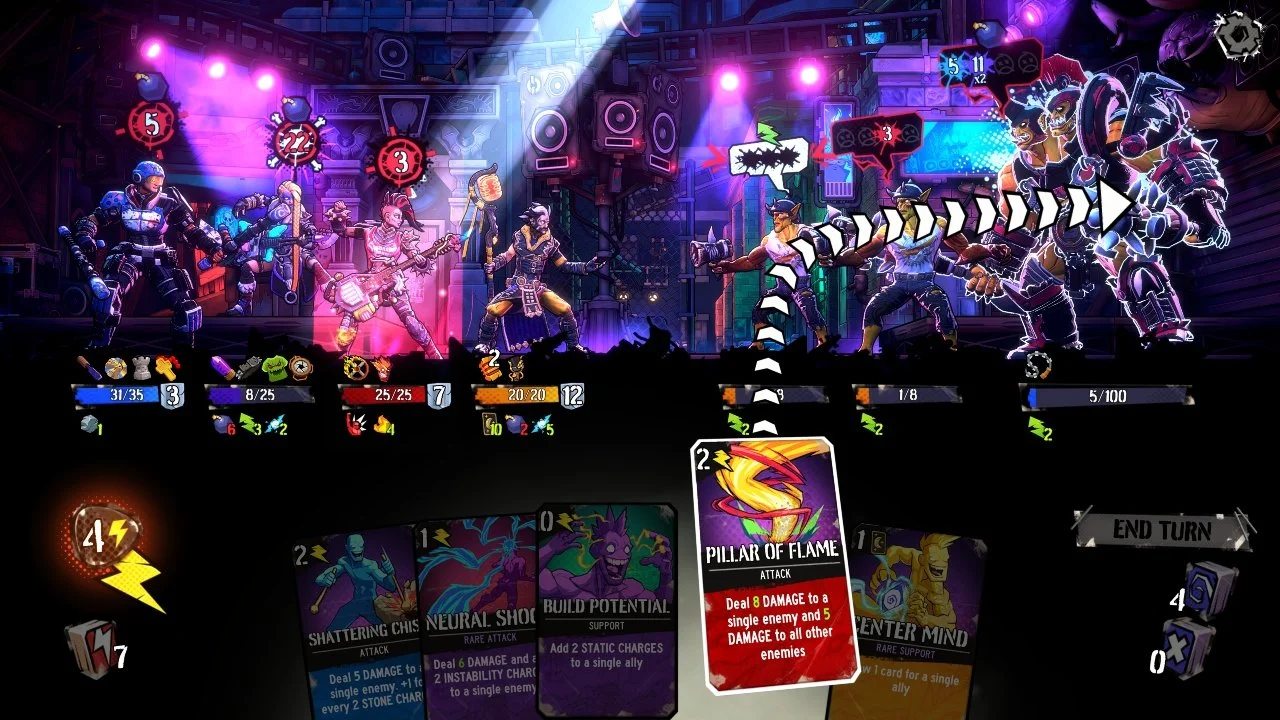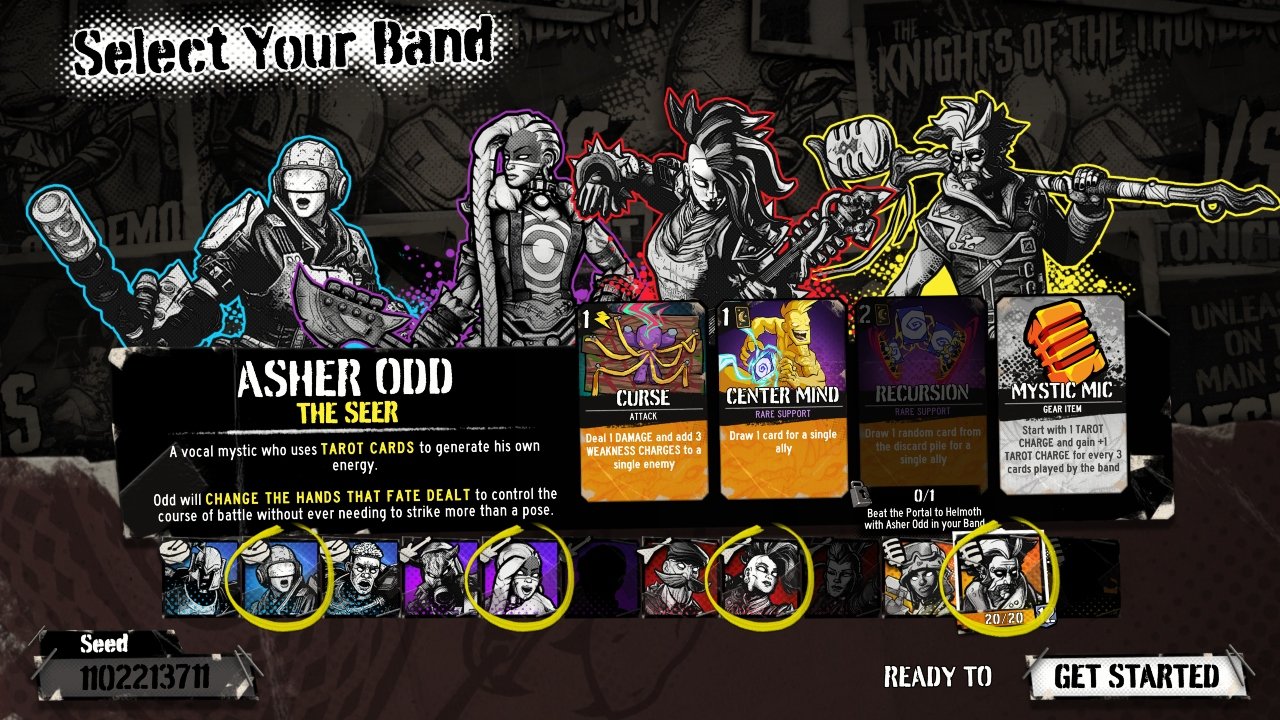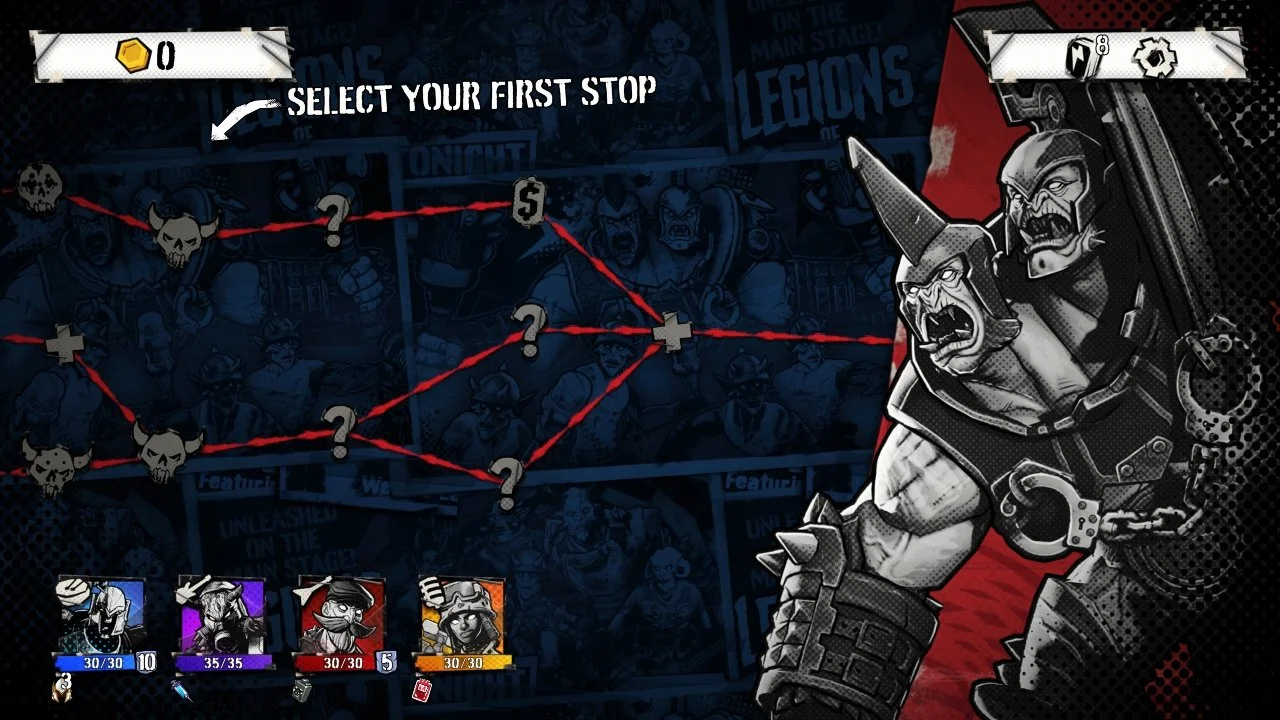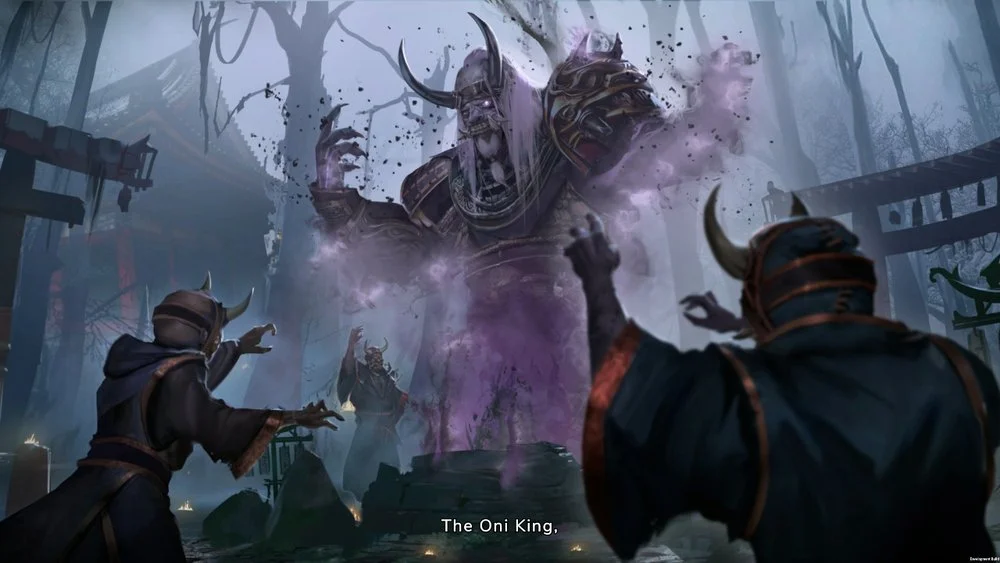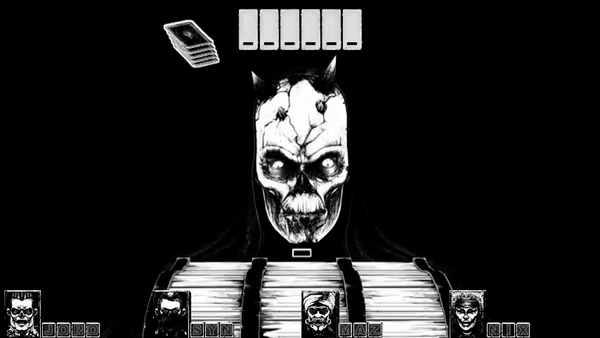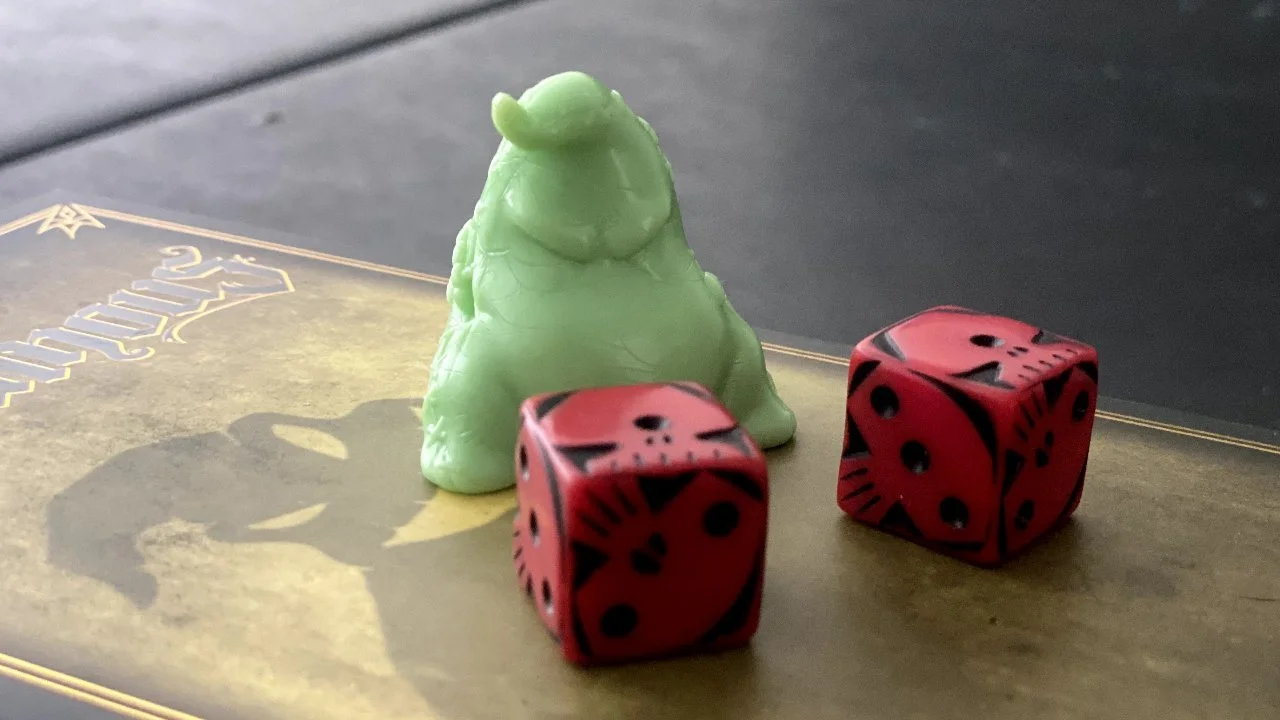PC Review Code Provided by Big Blue Bubble
Power Chord is the newest entry into the rogue-like deckbuilding genre from developer Big Blue Bubble, and it’s all about rockin’ out loud. Power Chord stands out from other entries in the genre with its comedic overtones and rock and roll style, blasting those… Power Chords straight to your dopamine receptors! Like all rogue-like deckbuilders, the key is to weave variability, replayability, and awesome combos into playthroughs that are a couple of hours long at most; and Power Chord definitely delivers.
Story
Power Chord begins with setting up the brief narrative with the short cutscenes standard in roguelikes. As expected with the genre the overarching story is outlined through the familiar cutscenes, then later the world-building is fleshed out through random in-game events, and graphic design.
The story of Power Chord is about rockin’ musician heroes known as Thunderfists, who fight against heavy metal demons trying to invade earth… and the local music venues. Like the legendary heroes of the past, you must collect all the sacred rockin’ relics, journey to the Hellmouth, and seal the demon’s forces away once again. Finally, should you fail, the last remaining hero from the first band to fight and seal away the demons will rewind time until you get it right!
Gameplay
Now the gameplay is what Power Chord is all about! At the start of each run, you will form your band from a selection of different musicians, each with unique abilities and cards. Every band needs a drummer, bassist, guitarist, and singer; each individual role equates to a standard position in an RPG style party. The drummer is the tank, the bassist is the debuffer/buffer, the guitarist is the DPS (damage-per-second), and the Singer is the support/healer. Depending on the cards and relics you collect along the way, however, you may end up with a DPS drummer, tank guitarist, and so on. The deckbuilding options of Power Chord offer plenty of versatility for the min-maxers among us.
Once in-game, Power Chord will randomize a map with multiple paths to choose from, and a variety of different types of encounters, from basic fights to elite fights to random events to shops to health stations, and at the end of the map is the boss for that level. After you beat the boss, a new map is created with the next boss at the end. There are 3 different maps in a run, with one additional extra hard final boss to beat after the third boss, who is only available if you collected the right items along the way.
Next up is the meat and potatoes of Power Chord, the combat system. As you progress through a run you collect a variety of different cards and relics that are available to you when you fight. In combat, you draw 5 cards from your current deck each turn. The deck is the combined cards of your different band members, if a band member is dead you no longer draw their cards until you get a chance to revive them; this can be a bonus and thin your deck if that band member doesn’t have the best set of cards at that time, but it also means damage from enemies is going to be more focused on your remaining band members. Combat is turn-based, and you start each round able to see what the enemy band will do on their turn so you can plan out your response. Tactically break enemy armor to stun them, armor allies, or weaken enemies that are planning to attack, all to lose as little health as possible each turn, because there are only so many rest stops to heal OR resurrect at (choose one), and the boss fights can be a doozy sometimes. At the end of fights, you are rewarded with cards for your deck, gold for shops, or relics to equip to your band for unique buffs. To summarize it’s important to make sure you optimize your deckbuilding as you collect cards and relics to maximize your protection, support, and damage in fights.
Audio and Visuals
In regards to the audio and visual quality, Power Chord is largely a success but can be a mixed bag. For a game all about rock and roll, it only has one main background track that does rock hard, but it gets repetitive quickly. They had such an awesome opportunity to go hard on the soundtrack with some awesome rock and metal music for different encounters, or boss fights, but it misses its moment with the one to two repetitive looping background tracks. Aside from that, they do an amazing job with the sound effects for interacting with the game, playing cards, and activating effects, all with that rockin’ theme applied.
The visuals of Power Chord are simply perfect if a bit repetitive. No one expects massive vistas in their deckbuilding rogue-likes, but nevertheless, the design and graphics for the game are beautifully stylized to match its rock and roll vs heavy metal theme. The game feels suitably grungy while remaining energetic and snappy. The U.I. is incredibly clear and easy to understand and has been amazingly designed. The only thing I might want is some more variation to the backgrounds in combat encounters.
Replayability
As always with rogue-likes, replayability is at an all-time high. I have 20 hours into the game and I still have plenty of things to unlock for new runs, and I’ve only made it to the final fight once. I will say that as with all rogue-likes, there aren’t as many things to unlock at launch, but I expect tons of new content to be added as time goes by. Currently, there are three different characters that are yet to be released, and I expect they will add a ton of awesome stuff to an already incredible game. The variety of combinations for bands you can create for runs adds a ton of replayability all by itself, even without considering how deckbuilding will vary with each run you play. One of the few drawbacks so far is the somewhat limited variation in combat encounters, as of yet there aren’t too many different enemies. Simply put, Power Chord is one of those games I don’t expect to get tired of. Every run is a new and interesting experience.
What It Could Have Done Better
Power Chord is an amazing game that I’ve had an incredible experience with, but I do think there are some things it should have done better. Frankly, as I said before, Power Chord missed a huge opportunity to have a ton of awesome rock n’ roll songs for its soundtrack. Given how well the game has played to the rock and roll theme as a whole, the mediocre, if fitting, current soundtrack is absurd.
The only other gripe I have with Power Chord is the enemy variability. As of yet, there aren’t a lot of different combat encounters you can run into. There’s certainly enough that the game never feels stale, but it feels strange that the player has more variability and styles of play with the variety of different bandmates available than the enemy forces do. For each cool thing a player’s musician can do, there should be an enemy that can do the same, that would be a relatively easy way to add some more variability to enemies, but it’s not there.
I will say, however, that I expect this to improve, with rogue-likes it’s incredibly common to add more content as time goes on and I expect enemies to be part of that. With how well Power Chord is made, and how they are already slowly releasing new content, I expect a consistent stream of new stuff to help keep Power Chord fresh for dedicated players.
Verdict
Power Chord is a rockin’ journey that I will enjoy over and over again! My experience with the game has definitely landed it on my Top Ten Rogue-like’s list, and I don’t see it leaving any time soon. I definitely plan to keep playing Power Chord in the future, and I’m nowhere near bored of it after 20 hours in. The comedic overtones and rock and roll style while cheesy at times certainly, make Power Chord stand out from the pack, let alone its unique and enjoyable take on combat. For only $20, I have to say Power Chord is a must-have for rogue-like or deckbuilding fans, and for everyone else I highly recommend trying it out if you get an opportunity. For me, Power Chord is an almost perfect game due to a few relatively small errors!
Power Chord is available on PC via Steam.
